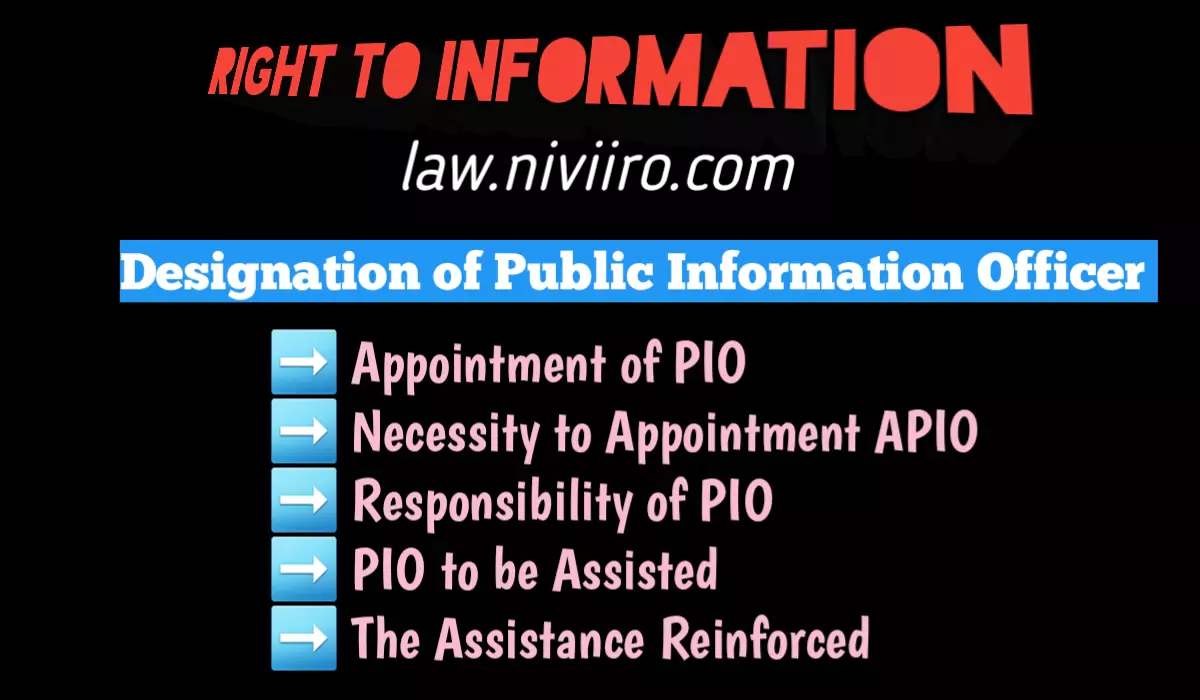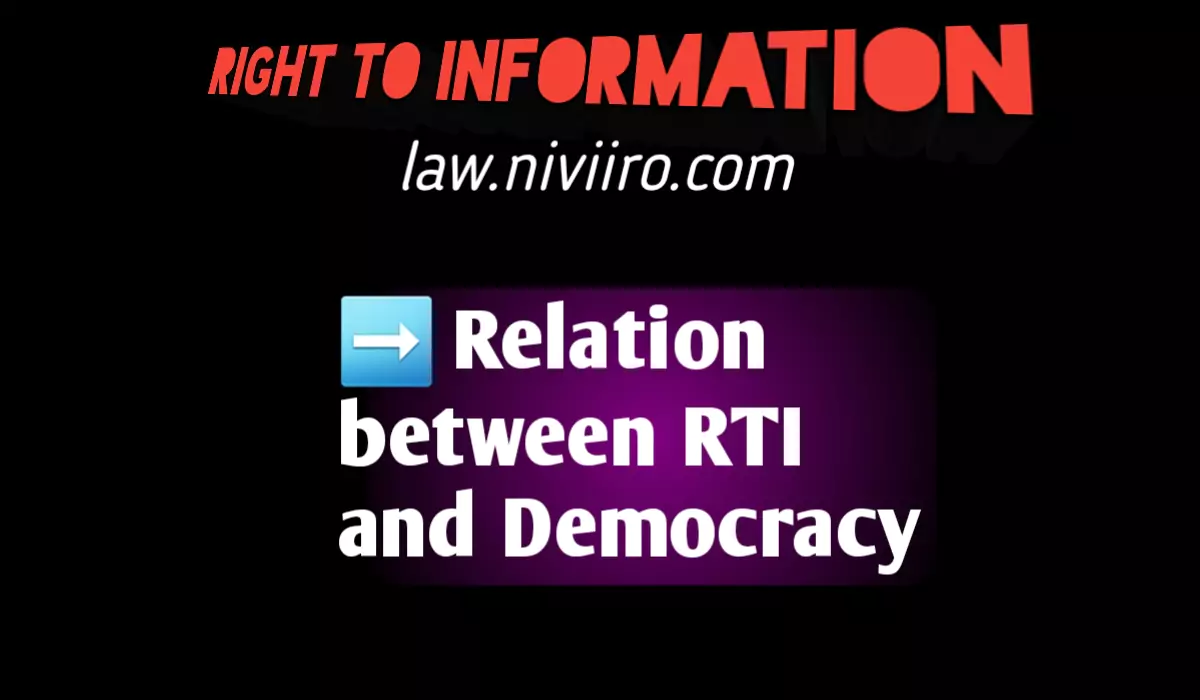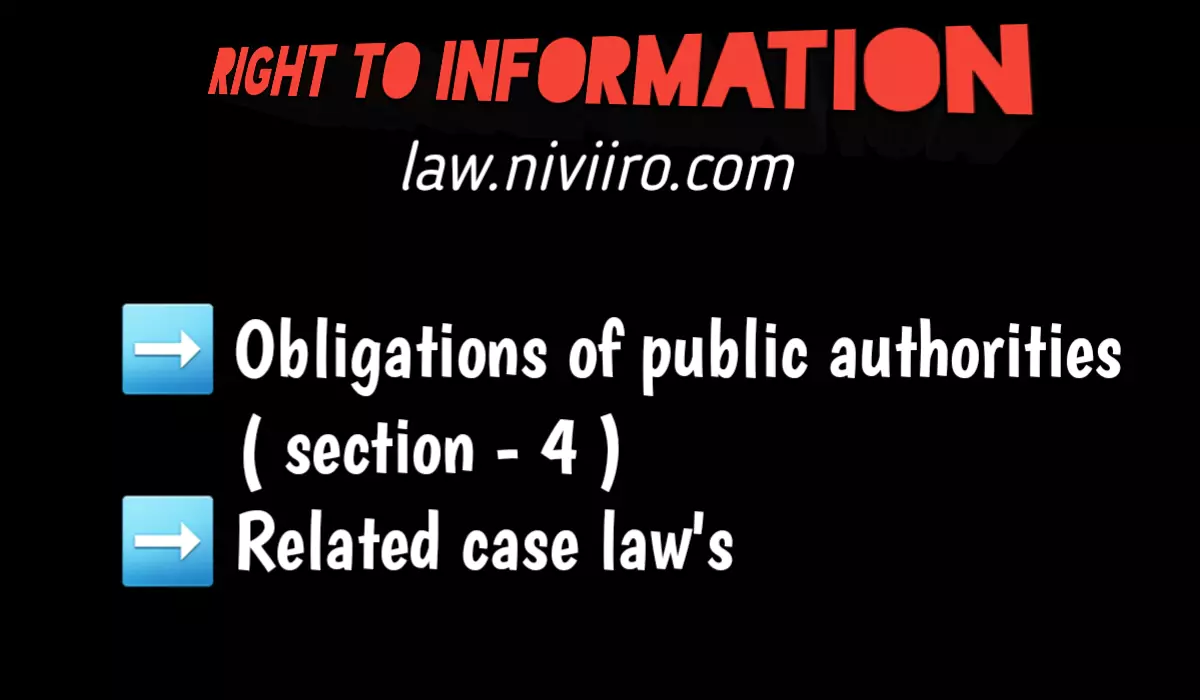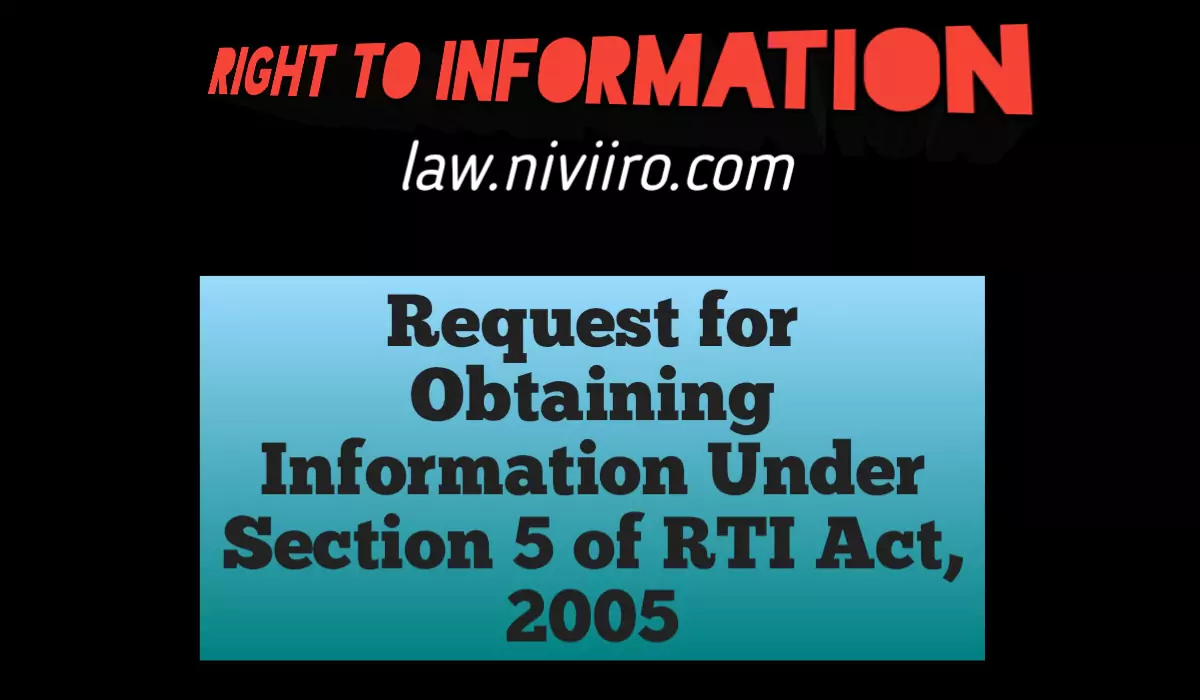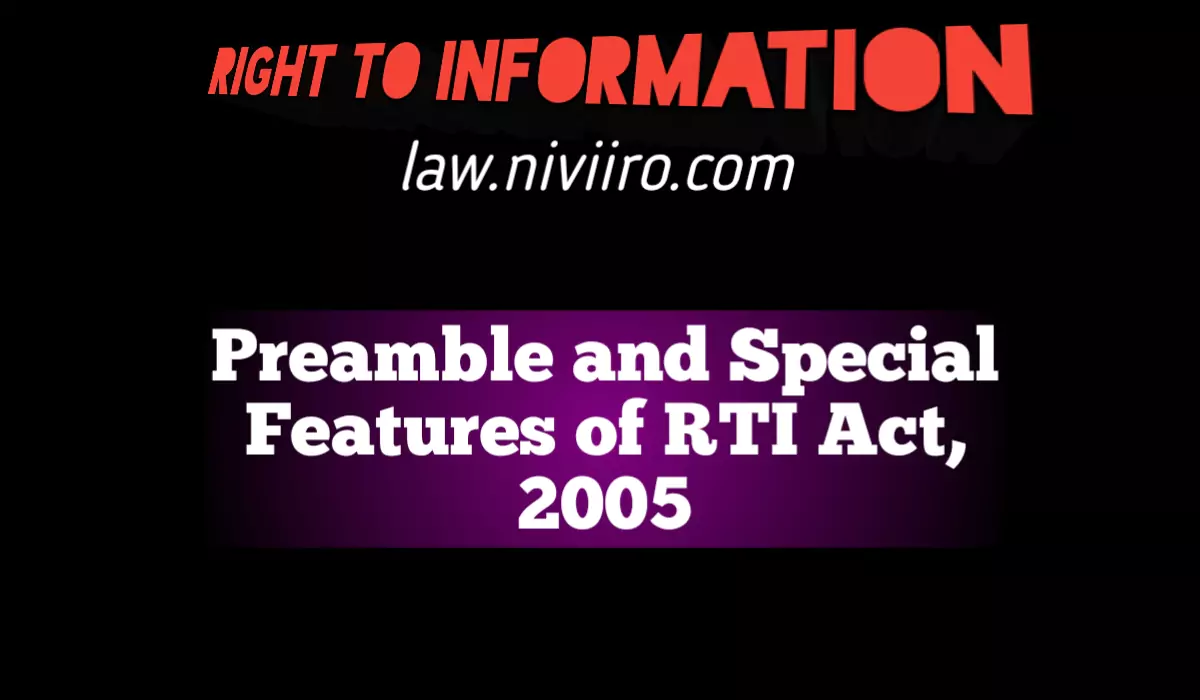Designation of Public Information Officers, Following are the Procedure of Appointment of Public Information Officers Under section 6 of Right To Information Act, 2005.
Appointment Of PIO { Sec.6 (1) }
(1) Every public authority shall, within one hundred days of the enactment of this Act, designate as many officers as the Central Public Information Officers or State Public Information Officers, as the case may be, in all administrative units or offices, under it as may be necessary to provide information to persons requesting for the information under this Act.
Explanation – This section addresses the primary functionary of the Right to Information Act. It mandates the appointment of Central Public Information Officers and State Public Information Officers by each public authority under the Act within one hundred days of the Act’s passage. To submit information under the Act, these officers must be appointed in each administrative unit or office functioning under the relevant public body.
The Public Information Officers appointed in this manner are the primary functionaries who work at the cutting-edge level. The Public Information Officer is entirely responsible for supplying information, and he communicates directly with citizens who file applications under the Act at the first stage. Given the importance of such offices, the Act requires their appointment within a specific time frame. In fact, the effective execution of the Act is impossible without such appointments, and hence such appointments represent the Act’s initial force.
It further states that the number of such officers appointed under the Act is not limited. The primary concern is the Act’s mandate for public authorities to meet the needs of residents. The public authority may appoint as many Public Information Officers as necessary to ensure the smooth flow of information under the Act’s provisions.
Necessity Of Appointment of APIO { Sec.6 (2) }
(2) without prejudice to the provision of sub-section (1), every public authority shall designate an officer, within one hundred days of the enactment of this Act, at each sub-divisional level or other sub-district level as a Central Assistant Public Information Officer or a State Assistant Public information Officer, as the case may be, to receive the applications for information or appeals under this Act for forwarding the same forthwith to the Central Public Information Officer or the State Public Information Officer or senior officer specified under sub-section (1) of Section 19 or the Central Information Commission or the State Information Commission, as the case may be :
Provided that where an application for information or appeal is given to a Central Assistant Public Information Officer or a State Assistant Public Information Officer, as the case may be, a period of five days shall be added in computing the period for response specified under sub-section (1) of Section 7.
Explanation – The Act has a broader scope of application. It intends to cover the most remote areas of the country and mandates the appointment of such officers at the sub-district and sub-division levels as well. To avoid duplication of effort in the dissemination of information, it calls for the appointment of Assistant Central Public Information Officers and Assistant State Public Information Officers at these levels. Their primary responsibility would be to receive applications and appeals under the Act at their level and forward them to the appropriate parties, such as the Public Information Officer or the appellate body.
This is for the obvious reason of expanding the Act’s operational region and assisting those living in more rural areas. These Assistant Public Information Officers would not be in charge of granting information or making decisions on such petitions. Their primary duty would be to facilitate the submission of applications and appeals from the public to decision-making agencies. Yet, their duty would be ultimate in this case. When they receive an application or an appeal, it is their job to forward it to the appropriate parties.
A term of 5 days has been added to the stipulated period of consideration of appeal and petitions by the involved authorities and officers to cover the transaction period from Assistant PIO to PIO. It would be in addition to the time allowed under Section 7 (1) for application decisions.
In terms of the first appellate authority’s response period, it might be prolonged up to 45 days with reasons to be recorded in writing under Section 19 (6), and this would be a valid basis for extending the stipulated period of thirty days for the decision of appeal under the stated provision.As far as the decision of the second appeal by the Central or the State Information Commission is concerned, there is no such time limit for it and therefore, any extension on this ground is not relevant.
However, regarding the receipt of appeal at the level of Assistant PIO it appears to be anomalous when there is no such power with the PIO to receive the appeals at his level. When the APIO is competent to receive the appeal the PIO should also do it. If the APIO has been given this power to facilitate the remotely situated people, the same facility could be provided by the PIO also in case of an appeal where the appellant authority or the Information Commission is located at a far off place.
However, this is missing in the Act and the Commission in the capacity of highest body under the Act, may pass such directions to the PIO under Section 19 (8) of the Act, or the Central Government may notify it under Section 30 (1) of the Act
Responsibility of PIO { Sec.6 (3) }
(3) Every Central Public Information Officer or State Public Information Officer, as the case may be, shall deal with requests from persons seeking information and render reasonable assistance to the persons seeking such information.
Explanation – This subsection expressly authorises and directs the PIO to handle applications submitted under the Act. It also mandates that such PIO provide all reasonable help to applicants. This expresses the fundamental spirit of the Act’s relationship between the PIO and the applicant. The PIO must not act just in his official function, but must be generous and magnanimous to the applicant, providing him with all courteous help.
Since the Act is new and the right conferred on the citizens has yet to unfold itself to the understanding of a common man, therefore, the Act anticipates the requirement of such help from the official hierarchy including the PIO.
PIO to be Assisted { Sec.6 (4) }
(4) The Central Public Information Officer or State Public Information Officer, as the case may be, may seek the assistance of any other officer as he or she considers it necessary for the proper discharge of his or her duties.
Explanation – When the PIO is deemed solely accountable for information disclosure under the Act, this section provides for necessary assistance to that officer. The operation of a public authority or a government agency is a complex and difficult task. It entails a level hierarchy and vertical and horizontal labour division.
As a result, under such a system, if a single person is made responsible for a specific topic, it is difficult for that person to respond to the requirements of the task given to him, especially when a chain of officials is engaged in the process.
As a result, this clause expressly allows the PIO to seek the aid of any other officer if it is deemed appropriate for the proper fulfilment of duties. Hence, the Act allows the PIO the authority to accept work from any body within the system if necessary, and this would not be sought as a personal favour from such person, but as a matter of statutory responsibility offered to such other person or officer under the provisions of the Act. To this degree, the task would be delegated to such officer.
The Assistance Reinforced { Sec.6 (5) }
(5) Any officer, whose assistance has been sought under sub-section (4), shall render all assistance to the Central Public Information Officer or State Public Information Officer, as the case may be, seeking his or her assistance and for the purposes of any contravention of the provisions of this Act, such other officer shall be treated as a Central Public Information Officer or State Public Information Officer, as the case may be.
Explanation – This subsection is an expanded and qualified version of the one before it. Subsection (4) provides for assistance to the PIO, but subsection (5) defines the obligation to give such support and the consequences of failure to do so. It has been made mandatory for the officer to help the PIO to the extent that such assistance has been requested from such officer. It is not a matter of choice, but rather of responsibility.
If such assistance is not supplied, the officer from whose assistance was requested is presumed to be SPIO for the purpose. The implication of this law is clear: such officer would bear responsibility for the violation. As a result, he or she will face criminal charges under Section 20 of the Act.
As a result, it not only protects the PIO but also instills a sense of collective responsibility within the public authority. As a word of caution, it is urged that this provision is intended to assist the PIO rather than to allow him to shirk or purposefully shift responsibility for the successful implementation of the right to. Any attempt to distort the spirit of this provision at either level, i.e., by the PIO or the officer whose aid has been sought, may frustrate the purpose and may be taken seriously by the Commission at an appropriate stage.Therefore, the Act anticipates a reciprocal gesture of good will at either end.
Related Post | Designation of Public Information Officers
- Central Information Commission | Composition | Term | Removal
- State Information Commission | Composition | Term and service | Removal
- Third Party Information Under RTI Act, 2005
- Powers and functions of the Central Information Commission and State Information Commission
- Preamble and Special Features of RTI Act, 2005
- Relation between RTI and democracy
- Obligations of Public Authorities Under RTI Act
- Important Legal Terms
- law-course-notes -tort
- political-science-notes
- legal-history notes
References
- The RTI Story: Power to the People by Aruna Roy, 2018
- Right to Information by K. B. Rai, 2020
- Right To Information Law & Practice by R. K. Verma, 2010
- Commentary on The Right to Information Act by J. N. Barowalia, 2010













